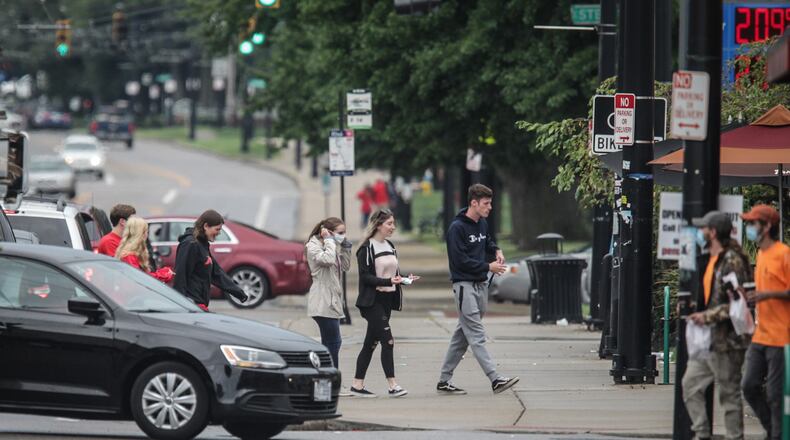“We’ve been getting really quick turnaround from our lab partners who are doing the testing so we’ve been able to detect these cases very quickly,” Shindell said. The students are reported isolating off campus or back home.
The cases are posted online by the university and last updated Aug. 18.
UD lists the university’s status with coronavirus cases as “contained,” which UD refers to as “a small number of individuals have tested positive, and contact tracing suggests that exposures are confined and the situation can be contained, isolated, and remediated.”
The university reported two students notified of positive tests Aug. 17, three students notified of positive tests Aug. 15, one on Aug. 14, one on Aug. 12, one on Aug. 11, and three on Aug. 10. An employee who tested positive Aug. 17 worked at Kennedy Union is self isolating off campus and another employee who worked at the library tested positive Aug. 6 and did not have any UD close contacts.
Contact tracing is underway on the three newest cases but complete on the others.
Public Health - Dayton & Montgomery County spokesman Dan Suffoletto the school’s health center is assisting with the contact tracing though Public Health is also notified of each case.
At UD, the university said under its student neighborhood gathering policies, that if there’s a large gathering, which is defined as 11 or more people, UD Public Safety will intervene and disciplinary action is highly likely. Drinking games are a code violation and can result in citations from UD Public Safety at any time, according to the policy.
Natalie Coppolino, University of Dayton Student Body President, said although things will be very different on campus this semester and perhaps this year as a whole, that she’s confident that the students at UD will step up to the responsibility of keeping each other safe.
“At the University of Dayton,we have an extremely close knit community and a strong sense of community, and although social distancing, keeping gatherings under 10 people and wearing masks is not ideal and not what we are used to, it is something that we all need to do if we want to remain on campus,” Coppolino said.
Suffoletto said while people might feel personally comfortable taking a risk and holding a gathering, they are not just personally taking a risk but are risking more spread of the virus which can harm other people.
“Mass gatherings should not be happening and people should not be going to them, if they do happen. If there’s people around in a physically tight situation, that’s going to increase your risk,” he said.
UD has a phased move-in from Aug. 8 to Sunday and classes start Monday. The university is starting its semester as the coronavirus remains widespread in the surrounding Montgomery County, according to the Ohio Public Health Advisory System.
UD’s reopening has not been without controversy, including a group that’s opposed to the University of Dayton’s fall COVID-19 reopening plan, which has said school officials are putting profits over student and employee health.
The group of faculty, staff, students and alumni previously sent a letter to the university president urging him to establish an effective plan for coronavirus testing and expanding paid leave for employees who get sick at work.
UD officials have disputed the claims of voices not being heard and opened based on rules set by its UD Path Forward Task Force, which the school said was supported by several working groups, state and local health officials and a medical panel.
The task force has extensive details online on how the university will operate, including saying that classes will be fully face-to-face; and some courses will involve a blend of online and face-to-face interaction. Some classes will be offered completely online due to class size or if faculty members cannot meet face-to-face with students.
All students, faculty and staff are required to complete training about protocols and expectation, which includes an agreement that students are required to sign.
According to UD’s rules, students aren’t supposed to have external guests. They are supposed to wear masks and keep a physical distance outside of the “household” they are in (those who live in each room, apartment or house is considered a household) and in all shared public indoor environments and outdoors when physical distancing isn’t possible.
Grace Gibson, incoming junior, opinion editor at the Flyer News and a commuter student from Vandalia, said she thinks going back to school right now is “a really bad idea.”
“UD is a party school and if you have just one person who does not follow the rules, we’re in trouble,” Gibson said.
Commuters have to worry about bringing the coronavirus back to their families. Professors and other staff also have to worry about bringing it from campus to their homes, she said. Gibson said she thinks an outbreak is inevitable.
“UD should take positive cases as a sign to shut down,” Gibson said. “They shut us down in the spring with no cases, I don’t know why we’re going back with cases.”
The Associated Press reported that nationally, other universities have been scrambling to deal with virus outbreaks.
Many schools already have flipped from in-person classes to mainly online in recent weeks, and more are expected to do so, David Long of Tuscany Strategy Consulting, told the AP. Long and the consulting company have teamed up with the Johns Hopkins Center for Health Security and the Council for Higher Education Accreditation to develop reopening recommendations for colleges and universities.
“It’s because it’s so difficult to create these systems where everybody is essentially behaving appropriately, meaning social distancing, wearing PPE and not gathering in groups,” he said, referring to personal protective equipment. “It’s challenging when you’re trying to control behavior in young adults, particularly in areas that are outside the classroom and off campus.”


